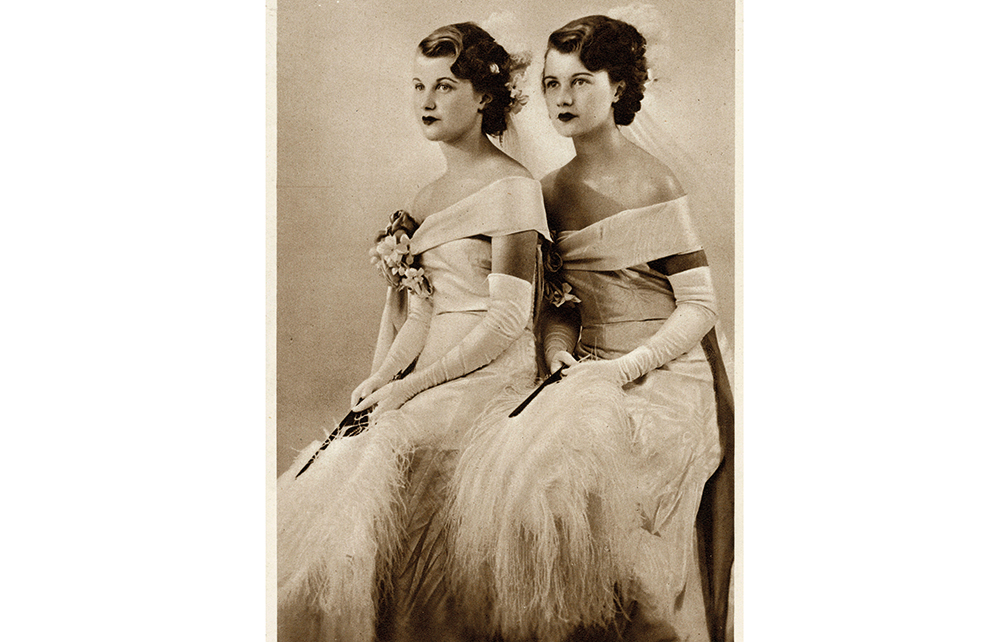The dazzlingly beautiful identical twins Mamaine and Celia Paget were born in 1916 and brought up in rural Suffolk – not the greatest springboard, you would think, for lives at the intellectual heart of the mid-20th century. Yet the list of their friends reads like a roll call of literary notables: Dick Wyndham, Peter Quennell, Cyril Connolly, Bertrand Russell, Sacheverell Sitwell and Laurie Lee. Between them, the twins were proposed to by, among others, Arthur Koestler and George Orwell; had liaisons with Albert Camus and the formidably clever Oxford philosopher Freddie Ayer; quarrelled with Jean-Paul Sartre and Simone de Beauvoir; and received love sonnets from the historian and poet Robert Conquest.
At the heart of this book, however, lies the girls’ twinship. Each was the most important person in the life of the other. Fortunately, those were the days when people wrote, and kept, letters, so that after Celia’s death her daughter Ariane Bankes, this book’s author, opened a large, battered black tin trunk to find it stuffed with diaries and correspondence. It proved a virtually complete record of the twins’ lives.
Both sisters yearned for an intellectual life and were not interested by any of the men they met at balls
Their childhood was one of happy isolation. Their mother died a week after they were born and their 50-year-old father employed a superb, loving nanny. Their universe was the fields and woods surrounding the house and garden in which they played with their pets. Both loved music and literature, and listened entranced to their father’s pianola recordings and when he read to them from the Victorian classics. The only cloud was the chronic asthma that would bedevil both their lives.
When the twins were 11 this blissful existence was turned upside down. Their father died, and they became the legal wards of their maternal uncle, a rich, testy man with a charming, kind French wife. Wrenched away from Suffolk and their beloved nanny and sent to a succession of boarding schools, they became even more interdependent. Few could tell them apart. As debutantes, this ‘double exposure’ enhanced their glamour, making them the sensation of the London Season. Yet they yearned for an intellectual life and were not interested in any of the men they met at balls and parties. ‘Oh, the boredom,’ Celia would later tell her daughter Ariane.
Suddenly the gates to the kind of existence they really wanted swung open, thanks to Mamaine’s new admirer Dick Wyndham. He was 20 years older than the twins, rich, generous, twice divorced and bohemian to his fingertips, with friends who included Connolly, Quennell and Sitwell as well as the composers Constant Lambert and William Walton. The group would gather in London at the Café Royal or the Gargoyle Club; at weekends there would be croquet, bathing, tennis and fancy dress parties at Wyndham’s house on the Sussex Downs. Made independent at 21 by a legacy from their father, with shared tastes and near-telepathic understanding of one another, the twins travelled constantly, exchanging an unceasing flow of letters with their now wide circle of friends. It was a dream life, but it was brought to an abrupt end by the outbreak of war in September 1939.
What follows is the saga of their loves and friendships. Both had the enviable gift of turning former or would-be lovers into close friends, resulting in a complicated pavane of interlocking relationships with some of the most brilliant minds of the past century. Mamaine began a six-year affair with Koestler, then best known for his searing novel Darkness at Noon, exposing the horrors of the Soviet show trials. Celia was courted by Orwell. ‘Envious congratulations!’ wrote Koestler to Orwell after receiving from him the draft of Animal Farm, a similar indictment of the Soviet regime.
Part of the book’s fascination lies in the domestic side of these intellectuals. Koestler, magnetic but implacably self-centred, offered marriage, with the proviso that it had to be childless, since nothing must come between him and his writing. Mamaine refused this one-sided bargain; but she believed in his work and agreed to live with him, typing and editing everything he wrote, often for 12 hours a day. He chose for their home what sounds like a masochist’s dream: a damp, remote Welsh farmhouse, icy in winter, with no hot water when the pipes froze and where they often subsisted on cold macaroni and tinned beef. One evening in the terrible winter of 1947, ‘as we were frying our dinner on the sitting-room fire, half the big 17th-century window fell in on us, followed by lashings of rain’, wrote Mamaine to Celia. Here are Koestler’s black moods, furious rages, drinking bouts and jealousy (Mamaine’s former lover Wyndham had begun to resurface from time to time).
A welcome break in Paris for Mamaine included dinner with the writer André Malraux, later minister of culture, who served the bizarre combination of whisky and oysters. (‘His eyes protrude and he talks non-stop,’ she recorded.) An evening dancing at a nightclub with Camus, then France’s leading left-wing intellectual, led to an ecstatic few weeks together in the south of France, where Camus was determined to buy a house. (‘Twin, you have no idea how attractive and sympathique Camus is.’) But though Mamaine remained obsessed with him for months, she returned to Koestler.
As for the Old Etonian Orwell, known as ‘Donkey George’ to the twins, he was so determined to infuse his life with working-class attitudes that he taught himself to prefer high tea to dinner and sardines and strong tea to oysters and champagne. He also refused to wear a dinner jacket – in those days an unheard of sartorial transgression for someone of his upbringing.
Neither sister was ever very long without a man. When Orwell retreated to the remote island of Jura, Celia, having turned down his proposal, was courted by Ayer. But what with his other women, peripatetic life and utter indifference to the arts, Freddie was not good husband material, Celia felt. A settled domestic life with children was what she wanted; so when an old admirer, the recently widowed Arthur Goodman, turned up, Celia, realising that he would hate to be rebuffed a second time, proposed to him and secured a happy marriage. Mamaine and Koestler had finally married, too, in 1950, but a year later, worn out by his tempests (‘things very bad with K, rows every night at dinner’), they parted for good.
Soon there would be a much more devastating parting. In 1954, the asthma that had plagued Mamaine all her life – no doubt aggravated by Koestler’s unswerving predilection for damp houses – killed her. For Celia, who had lost her other half, it was, as she wrote to Camus, ‘as though I had died myself and yet were still alive to suffer’. But oh, what lives they both led!







Comments